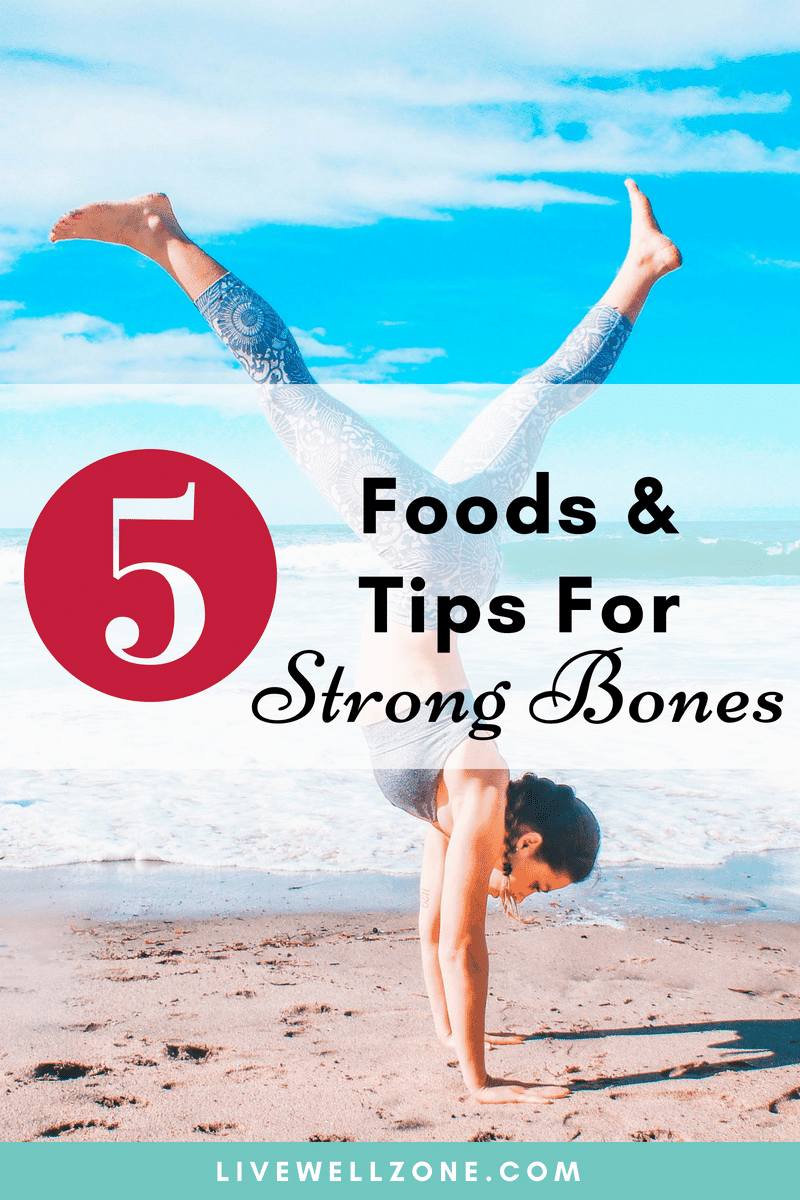How many times did you hear “drink your milk” when you were a child?
In my case, I heard it often!
And even though we’ve all been drinking our milk (and other forms of dairy) studies (1, 2, 3) show that getting strong bones is not just about dairy foods or calcium.

The reality is that our bones need different types of foods and activities in order to stay strong.
And in this post, I’m going to break down the foods and lifestyle habits you need for strong and healthy bones.
5 FOODS AND TIPS FOR STRONG BONES
1) Favor Organic and non-GMO foods
Eating organic and non-GMO foods is one of the most important changes you can make to improve bone health.
Conventionally farmed food is made from genetically modified seeds and then sprayed with pesticides, all of which leads to the food containing toxins.
These toxic materials cause our bodies to become acidic.
When the body is acidic, it withdraws minerals from the bones and if this acidic state continues for months or years, it means the bones are constantly being depleted of minerals.
This leads to various bones diseases.
By buying food that carries a USDA Organic food label, you’ll significantly reduce your exposure to toxins, re-nourishing your body and restoring overall balance.
2) Consume Vitamin D-rich Foods
Vitamin D is one of the key nutrients that the body needs for calcium absorption.
Without sufficient Vitamin D, the calcium you eat isn’t absorbed, and this can eventually lead to weak and unhealthy bones.
Although daily exposure to sunlight is the best way our bodies to make vitamin, we can also get vitamin D for foods.
Tuna, mackerel, salmon, eggs and mushrooms are food natural sources of vitamin D.
And when it comes to the eggs, it’s best to buy eggs that are labeled as “pasture-raised” because these eggs comes from chickens that get regular sun exposure.
3) Consume Foods High in Vitamin K
Our bodies are constantly building new bone and discarding old, brittle bone.
The process of building new bone relies on vitamin K.
Vitamin K activates a protein called osteocalcin, and this protein is in charge of getting calcium into your bones so that new, strong bones can be built.
As you can see, vitamin K essentially “feeds” the bones so that they stay strong.
Fermented foods like sauerkraut, kimchi and yogurt are some of the highest sources of vitamin k and should definitely be a staple in your kitchen.
Other good sources of vitamin K are: leafy greens (kale, spinach, chard, collards, dandelion greens, beet greens, etc.), scallions, brussel sprouts, cabbage, broccoli, prunes, cucumbers, miso.
4) Take A Magnesium Supplement
The excessive use of non-GMO seeds and toxic pesticides, has led to the depletion of essential minerals in our soil.
And this, in turn, has led to many foods being very low in minerals (and in some cases, totally lacking some minerals).
One of the most important of these minerals, magnesium, is practically absent from our soil and foods.
Common pesticides like Glyphosate have been shown to chelate minerals like magnesium.
In this case, “chelate” simply means that glyphosate molecules wrap themselves around magnesium, making the magnesium unavailable to you when you eat food.
The best way to remedy this is to take a good quality magnesium supplement. The current RDA (recommended dietary allowance) for adult women is 320mg of magnesium per day.
5) Exercise Regularly
Our bodies have cells called osteoblasts that are in charge of building new bone.
These cells are strongly stimulated by exercise, and in particular, weight-bearing exercises.
This can be anything from weight lifting and walking, to yoga, dancing or tai chi.
Whether you’re carrying extra weights from dumbbells, or simply moving your own body weight around, the important thing is to exercise on a regular basis.
The intensity isn’t nearly as critical as the regularity and consistency. And your bones will thank you for it!


